- Home
- Susanna Kearsley
Season of Storms Page 15
Season of Storms Read online
Page 15
Only when he finally spoke it didn’t come as a relief. If anything, it threw me more off balance.
Nicholas read without any expression—his voice was a monotone, lifeless and dull. I had friends who knew actors who did this, kept their first readings free of emotion so as not to commit themselves to any particular interpretation of their character; but I’d never had somebody do it with me. It was highly unnerving.
“Well,” said Rupert, as I miserably spoke the last line of Act One, “I think that’s as good a place as any for a break, don’t you?”
Den agreed. “I’ll go see if Teresa can make us some tea.”
Thank heavens I had an excuse to escape, I reminded myself, gratefully remembering Alex’s invitation to come e-mail Bryan when we had our break. I stood, self-conscious. “I think I’ll go and stretch my legs a bit.”
Rupert nodded his consent. Nicholas, in the act of lighting a cigarette, didn’t react at all. The others merely smiled. But Madeleine pushed back her chair. “I’ll come with you.”
I hadn’t planned on that. I must have looked a bit confused, because she said, “That is, if you don’t mind?”
And what, I wondered, could I say to that? Except, “Of course I don’t.” The problem was, I thought as we left the mirrored ballroom and went out into the corridor—the problem was that now I couldn’t do what I had meant to do. I couldn’t take Madeleine with me to Alex’s study, not after I’d said I just wanted to go stretch my legs. But if not to Alex’s study, then where . . . ?
“Let’s go out to the terrace,” said Madeleine. “I could do with a breath of fresh air.”
xiii
SHE had clearly been learning her way round the house. Whereas I would have got all turned around trying to decide which way was which, Madeleine simply opened a door from the corridor and led me through an empty room whose long French windows opened out directly to the terrace.
The stones were still wet with the rain that had fallen at breakfast, and the heavy mist clung to the darkly treed hillside behind us and shrouded the opposite shore of the lake. The high golden walls of the house at my back showed the only real colour, and even that had flattened in the absence of the sun. But for the present, anyway, the rain had stopped, and the breeze blew clean and cool and had a brisk, reviving scent.
Madeleine breathed it in deeply and tipped her face up like a child. “That’s better. I can’t stay too long in a room without windows.” She stretched and moved forwards to stand by the parapet.
Even just standing at rest she commanded attention, I thought bleakly. I could never look like that. Oh, why had I taken this part? Madeleine and Nicholas were in another league, I’d never match them in performance. Kicking myself, I looked up and across at the mist-covered mountains, only half-aware that Madeleine was speaking.
“. . . And Rupert reminds me so much of the man who directed my first West End play—he was quiet, like Rupert, but brilliant, and here I was barely nineteen with my first leading role and they had me playing opposite Sebastian Boyd, of all people, and I was absolutely terrified. I wanted so badly to please everyone that I went all to pieces.” Her voice was quite light, and her gaze was still turned to the lake, and she might have been simply relating an anecdote. Only I knew better. Focussing my full attention on her, I stayed silent as she went on, “By the end of the first week I was certain they were going to recast my part, I was that awful. And then one day Sebastian came up to me after rehearsal—I’ll never forget, he’d grown a beard for the play and he had those fierce eyebrows, you know, and he looked just like Moses come down from the mountain to give me an earful. I felt sure he was going to tell me I’d chosen the wrong line of work. But he didn’t. He asked me,” she said, with a smile of remembrance, “if I’d ever heard the fable of the old man and the donkey. You know the one, about the old man and his grandson and the donkey, and they’re going along and someone they meet says that one of them ought to be riding the donkey, so the old man puts the boy on the donkey and the next person they pass says how horrible, look at that young able boy on the donkey and the old man struggling along. So the boy gets down and the old man rides the donkey, and of course that doesn’t do either, because the next person thinks that the little boy shouldn’t be made to walk; so they both get on the donkey, and then everyone says oh, how cruel, to make the donkey carry so much weight. And in the end I think they wind up carrying the donkey, and they have a fall, or something, and then none of them can ride. At any rate,” she said, “Sebastian asked me did I know the fable, and I told him yes, I did. And he said, ‘Well then’ ”—she did a fair imitation of the venerable Shakespearean actor, catching his booming voice and trademark glare—“ ‘Well then, stop worrying so much what the rest of us think; just get on the damned donkey and ride it.’ ” She turned her head then, and her smile was deliberately kind. “I always thought that good advice,” she said.
I thought it good advice as well, and took it.
Back in the rehearsal room I shut my mind to everyone else and, ignoring Nicholas’s deadpan delivery, gave myself over to reading the part. The second and third acts went off like a dream. When I’d finished I looked up and saw Rupert’s eyes and I knew I’d done well.
“Very good,” he said, pleased. “Very good, everyone. After lunch, we’ll go back then and take it by scenes, all right?”
A chair scraped beside me as Den rose and stretched with a grin. “That was one hell of a comeback,” he murmured. “What did Madeleine do to you at break?”
“Nothing,” I said. “We just talked.”
“I thought maybe she was out there feeding you triple martinis, or something, to make you relax.” His grin grew broader as he reached an arm across to hug my shoulders. “Good work, anyway. You’ll do just fine.”
The tempting smells of roasting meat came wafting through the passage as we left the rehearsal room, beckoning us to our lunch, but there was something I needed to do first. “I’ll catch you up—won’t be a minute,” I said to the others, and parting from them went the other way along the corridor.
xiv
I had no guarantee, of course, that Alex would even still be there. He’d said to come at morning break, and not at noon, but even so I thought it worth a try.
For once I had no trouble finding my way—the rooms, as before, led neatly one into the other, the thickly laid carpets hushing my steps as I moved through the dust-scented shadows. Only this time, as I was approaching the closed door of the room that I assumed was Alex’s office or study, I saw someone else coming, too, from the other direction. A man, middle-aged, wearing working clothes.
He didn’t see me. I was still a good room-length away, and at any rate he wasn’t looking up. His head was bent as though in thought, his walk purposeful. Reaching Alex’s door he knocked and then, not waiting for an answer, opened the door and looked in. In profile his face had a fierce, hawk-like quality, helped by the hooked nose and hard, thin-lipped mouth.
He said something urgent and sharp, Alex answered, and then with a slight frown the hawk-faced man went in and shut the door behind him.
Probably one of the workmen, I thought, with a problem. Not wanting to interrupt their business for something as frivolous as my e-mail to Bryan, I turned again, retreating quietly through the semidarkened rooms, and let my stomach lead me through the twisting corridors to where the others had already gathered in the dining room for lunch.
xv
THE afternoon flew.
Six o’clock came quickly, and before I knew it everyone was packing up their scripts and getting to their feet with yawns and stretches, and the Italians were shaking our hands again and saying their goodbyes, and that was that. The first day over.
I debated whether I should try one more time to reach Alex in his study, but in the end I reasoned that he probably wouldn’t be there anymore, so I went upstairs instead to bathe and change, telling myself I could talk to him later, at dinner.
But he wasn’t at dinner.
His chair at the head of the table stayed empty while our starters were served, and when Rupert asked Teresa if we shouldn’t wait she shook her head and answered something back to the effect that Signor D’Ascanio had been called out on business and wouldn’t be joining us.
Teresa seemed more sociable today. She had a young woman helping her with the serving tonight—a quietly nervous young woman whose tentative movements reminded me of the time I’d been in training myself as a waitress. The new maid, I assumed, and her presence explained why Teresa looked less strained.
Looking at the two empty chairs near the head of the table, I found myself wondering what sort of business had called Alex away this evening, and whether he was alone, but my wondering stopped when Daniela Forlani arrived, coming late to the table with the nonchalance of someone who was used to having others adapt to her schedule.
Again, as before, her appearance distracted the men. All except Rupert, of course, and even he seemed to find her of interest, eyeing her the way he might admire a classic sculpture. And that didn’t make me like her any better.
She sat—I thought deliberately—between Nicholas and Madeleine, and shaking out her napkin asked for wine. “This rain makes me cold, and I have spent much time outdoors today with my men, to see how they progress with their work.”
Rupert, always first to get a conversation started, asked her if her men lived in the town.
“No, here,” she corrected him. “Here in the grounds. If you take the path down towards my villa, you will pass the outhouses where they stay.”
Den glanced up from his plate, eyebrow lifting. “Your men stay in outhouses?”
Rupert was smiling. “Not American outhouses, Dennis. They’re not outdoor lavs, they’re just outbuildings on the estate.”
“Well, why didn’t you say so?” Den grinned.
Daniela, unconcerned with the differences between British and American English, took a look around. “Where is Alessandro?”
Rupert said, “Teresa told us he’d been called away.”
“Oh, yes? I hope he is not late,” she said. “He promised to come down and light my fires tonight.” I thought that a remarkably racy statement for her to make in the company of strangers, until I looked at her face and realized she wasn’t aware of the English double meaning of the phrase. To our raised eyebrows, she explained, “The fires in my house are so old, I cannot make them light. And it is still so cold for spring.”
Den leaned forwards, all charm. “I could come and take a look at them, if you like. I’m not too bad at lighting fires.” The double meaning came across more plainly in his words, but once again Daniela missed it, acknowledging his offer with a wave of one manicured hand.
“Oh, no, it is all right. It will be easier for Alessandro, he has done it many times.”
Den lifted his wineglass and murmured, “I’m sure he has, the lucky bastard.” Then more clearly, he asked, “Do you always stay down in the villa? Why not in the main house?”
She shrugged. “I am used to much space. To have only one room to myself, that I would not like.”
She must, I thought, be used to quite a lot of space, to judge the rooms of Il Piacere as being too small, too confining. My own suite was larger by half than my flat. I said aloud, “Your work must keep you busy.”
“Yes, I am always travelling. This past week alone I have been to Sardinia, Rome.” Still no mention of Venice, I thought. She went on, “The Trust has many properties. But that is good. It was the wish of my late husband that the most beautiful homes of our country be kept for all Italians to enjoy. He would be very happy that we have Il Piacere. He was a great admirer of Alessandro’s grandfather.”
They’d both had a lech for young women, I thought. Although in Daniela’s late husband’s case, it had probably been the other way around. I might be willing to believe that Celia the First had stayed with Galeazzo out of love, but from my short acquaintance with Daniela I somehow doubted love had been the motive for her marriage to an old and wealthy man. I doubted, too, that love had any role to play in her relationship with Alex. He was wealthy, too.
Madeleine was asking, “Where will Alex live, when the Trust takes possession of Il Piacere? Do you know?”
“He has other homes, of course,” Daniela said, her tone implying that everyone had a few homes scattered round. “And he will have the use of this one for his lifetime.” Switching subjects out of boredom, she asked Madeleine in turn, “I am told your daughter comes this weekend, this is true?”
Madeleine confirmed it with a smile. “Alex has been very kind in making the arrangements.”
“And this will not interfere with your work, having a child to look after?”
“Oh, I shouldn’t think so. I expect she’ll be sleeping for most of the time. She’s got glandular fever.”
Den looked over. “What’s glandular fever?”
Rupert, again translating British to American, said, “Mononucleosis.”
“Oh. Yeah, mono knocks you flat on your back, poor kid.”
“If she actually has it,” said Nicholas. “I wouldn’t put it past Poppy to fake being ill just to get what she wants.”
Madeleine sighed. “Nicky . . .”
“I’m only saying.”
“Poppy?” Daniela arched her eyebrows. “This is your daughter’s name? It is peculiar.”
Madeleine only smiled politely and went on with her dinner, but I couldn’t help cutting in, “I think it’s a lovely name, actually.”
“Celia,” said Rupert, “could you pass the carrots, please?”
“I’d have loved to have had a name like Poppy, something distinctive, instead of having to share the name Celia with three other girls in my class.”
“But then,” Daniela said, “you would not have been given a role in this play, yes?”
“Celia love, the carrots.” Rupert tried again, and this time, biting my tongue with an effort, I gave in and passed him the serving dish as Daniela, oblivious, turned her attention to Nicholas.
“So, you have started rehearsals today, I hear?”
“Yes, that’s right.”
“I must come one day and watch you. I have wanted many times to see the way a play develops in the days before it is performed.”
Madeleine’s gaze lifted briefly, so subtle a movement that I would have missed it if I hadn’t been looking right at her. But Rupert saw. Sending her a silent glance of reassurance, he said to Daniela, “I’m afraid we don’t have visitors at this stage of rehearsal. It’s a little too distracting.”
“I see.” In spite of her light tone I sensed that she, like Nicholas, was not at all accustomed to being told what she could and couldn’t do. And if she truly wanted something, I suspected that she wouldn’t be put off.
xvi
I had just settled in with The Season of Storms on my sitting-room sofa when somebody knocked at my door.
It was Teresa.
“Signorina Sands, Signor D’Ascanio says would you like to come now. He waits in the Veranda della Diana.”
“I’m sorry . . . where?”
“The Veranda della Diana. Is the room where he works. I will take you.”
I would have liked some time to tidy up, to brush my hair at least, but already she was moving off and I didn’t trust myself to find the room without her help. It was much easier, admittedly, to follow someone else through the corridors, though Teresa’s straight back and formal efficiency made me feel rather as though I’d been summoned to an audience with royalty. Descending the main sweep of stairs to the ground floor entrance hall, I felt the watching eyes of disembodied statuary heads set into niches in the wall, and fancied they were living courtiers looking on as I was being ushered to the presence of the king.
I could have found my way from there—I’d done it twice today already. But Teresa insisted on taking me all the way through to the door of the study, even knocking to announce me and then melting back into the shadowy rooms we had passed through before I
could thank her.
A single sharp ‘woof’ replied to the knock, and one of the greyhounds padded to the door and sniffed as Alex’s voice called out, “Come in.”
I pushed the door open with caution, because of the dog, but Max had already stepped back, long tail wagging a gentlemanly welcome. Stretching his head to examine the hand I held out, he permitted me to briefly stroke one ear before he wheeled and trotted back to take his place beside his master.
He had a fair distance to cover; the room was quite long. It was, though, the cosiest room I’d seen yet in the villa, a sort of blend of study and conservatory that jutted out from the house, a true enclosed veranda, with long windows running round the three outer walls and bookshelves with leaded glass fronts lining the fourth. The ubiquitous oriental carpets added warmth here, worn though they were, and the faded striped draperies had been drawn against the night, holding in the glow of floor and desk lamps at the far end of the room. There were several chairs set round haphazardly—a couple in woven cane with cushions in the same striped drapery fabric, and another leather armchair that was clearly meant for reading—but the room had been designed, I thought, for work.
The wide wooden desk at the far end was littered with papers and books that competed for room with a bulky computer. Behind that sat Alex, and behind him a bronze statue posed on a pillar, a female figure holding bow and arrow with a hound curled round her feet. The goddess Diana, I thought. Hence the name of the room.
Alex glanced up from his desk. In the light of his computer screen his face looked deathly tired. “Good,” he said, “I’m glad she found you. I felt very bad for missing you this morning.”

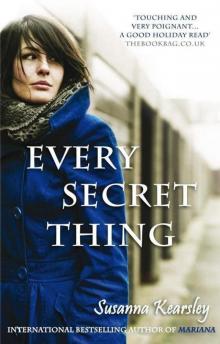 Every Secret Thing
Every Secret Thing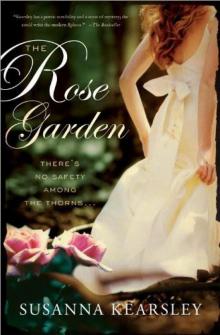 The Rose Garden
The Rose Garden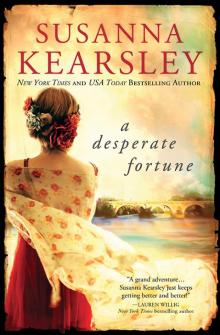 A Desperate Fortune
A Desperate Fortune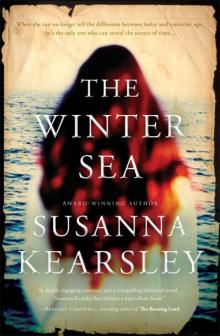 The Winter Sea
The Winter Sea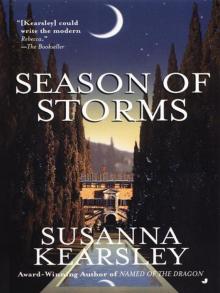 Season of Storms
Season of Storms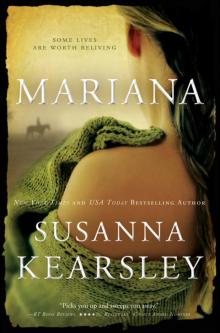 Mariana
Mariana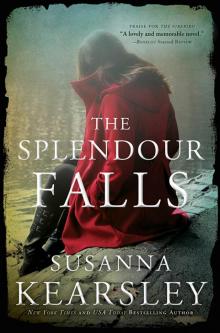 The Splendour Falls
The Splendour Falls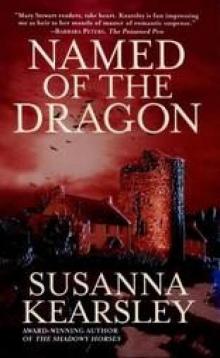 Named of the Dragon
Named of the Dragon Sophia's Secret
Sophia's Secret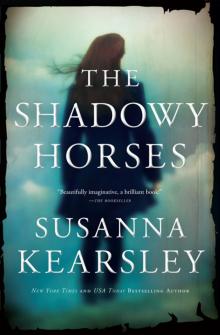 The Shadowy Horses
The Shadowy Horses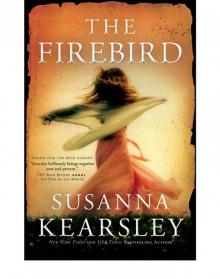 The Firebird
The Firebird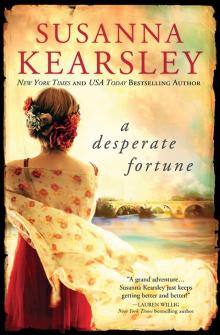 Desperate Fortune
Desperate Fortune